Making Bad Hardware Design Fun: Remembering Boktai
Hideo Kojima's cult classic brought Metal Gear's sophistication to bear as he attempted to solve the problem of the Game Boy Advance's terrible screen.
This article first appeared on USgamer, a partner publication of VG247. Some content, such as this article, has been migrated to VG247 for posterity after USgamer's closure - but it has not been edited or further vetted by the VG247 team.
Ten years ago today, I arrived in San Francisco with nothing to my name but a few bucks, whatever possessions I could cram into the tiny Nissan compact I'd driven across the country, and the promise of a new job.
The following months -- especially the ones before the website I'd been hired to work for launched -- felt very transitory for me as I came to terms with both my new role and my new home. Coincidentally, it was a single video game that helped me cope on both fronts: Kojima Productions' Boktai: The Sun is in Your Hand.
Boktai felt instantly familiar; its designers had built it primarily on the framework of the woefully underrated Metal Gear Solid (aka Metal Gear: Ghost Babel), my favorite Game Boy Color title. Though the setting had shifted from modern-day military action to a post-apocalyptic wasteland ruled by vampires, and the visual perspective changed from top-down to isometric, Boktai played by many of the same rules as Metal Gear. Its protagonist, vampire hunter Django, crept stealthily through crypts and ruins, sneaking behind zombies or luring them by knocking on walls. Avoidance, not conflict, was the rule of the day.
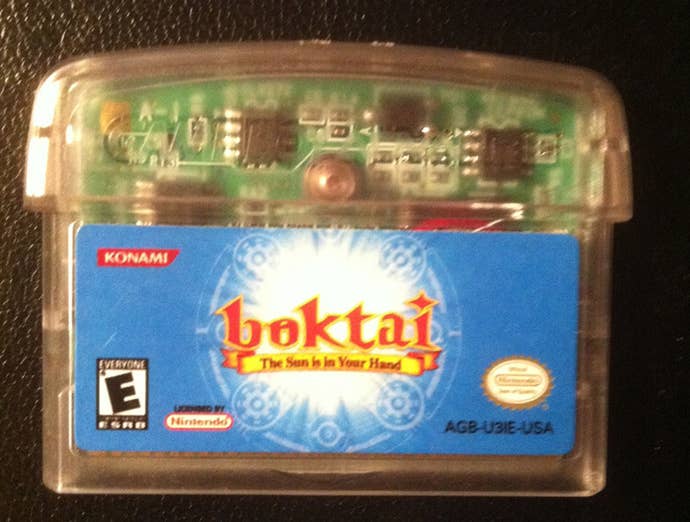
Yet Boktai offered more than simply a mash-up of Metal Gear and Castlevania. Its undead world drew heavily on spaghetti westerns -- hence the hero's name -- and it build its fundamental gameplay around a single key principle of vampire mythology. The name "Boktai" is short for the game's Japanese title, Bokura No Taiyo: "Our Sun." And the sun plays a huge role in Boktai.
Solar power literally fuels Django's weaponry, as the game shipped in a special transparent cartridge with a special extension in its outer edge that contained a special sensor. This was no mere light sensor but rather a more advanced model sensitive only to UV radiation. When bathed in sunlight, the sensor feeds that data into the game and allows Django to recharge his gun by simply holding it aloft (with a cry of "Sunlight!"). But take away that live solar power and Django has to forage for rare, hidden light crystals to sustain his offensive capabilities.
While smart, cautious play makes it possible to slip through much of Boktai's world without the aid of sunlight, certain key moments depend on it and simply can't be cleared in the dark of night. Bosses in particular require sunlight to purge them and ensure their ultimate destruction; once a boss is beaten, you must drag its coffin (another Django nod) to the entrance of the dungeon where a special device, the Solar Pile, awaits to convert real-life sunlight into special beams that burn the monster away once and for all.
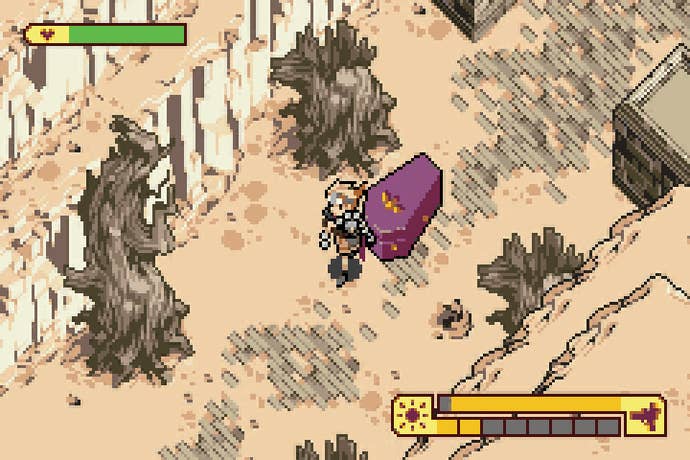
Boktai even includes a real-time day/night cycle that varies according to geographic location and season, quite accurately counting down the hours and minutes until sunset as you travel from area to area. This real-time mechanic can even work against you, especially when transporting the remains of a defeated boss; let go of the coffin and the boss' spirit will cause it to creep slowly back toward its lair. Save and shut down the game during one of these sequences, and when you return to play again the coffin will have sneaked away. The distance it travels varies according to the amount of time since your last session.
If this sounds annoying, well, yes, it can be. Yet it creates a game experience quite unlike any other. Not only does the time of day matter in Boktai, but your location does, too. Not in the sense of GPS coordinates, either, but rather the variable particulars: Where you sit, the availability of natural light, the weather, and more. Like to play at night? Tough luck! Live somewhere that's always foggy (like, say, San Francisco)? Deal with it! But like any coquette who has mastered the game of playing hard-to-get, Boktai's demanding nature made playing it all the more enticing. It inspired a sort of meta-game, forcing players to develop strategies not only for playing the game but pertaining to how the game is played as well.
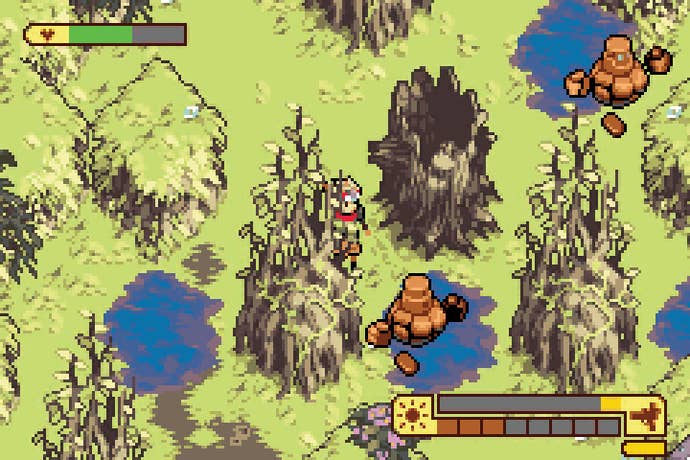
Boktai imposed a baroque and complex set of requirements to be sure, but its unconventional design almost certainly evolved from the deficiencies of its host hardware. Nintendo's original Game Boy Advance model was practically unplayable indoors, with a dim screen that required direct light for play. A lack of backlighting had been tolerable on earlier 8-bit Game Boy models with their simpler graphics, but GBA brought more complex and detailed visuals to the table, and these tended to wash out or become muddy under anything but direct light.
But how to ensure people would play the game in bright conditions? Boktai's answer: Make it mandatory.
An extreme solution to be sure, but somehow perfectly fitting coming from Hideo Kojima, a man known for his love of manipulating audiences and breaking the fourth wall in video games. Kojima's history is riddled with similar shenanigans, such as forcing players to turn up the volume to hear a faint sound in Snatcher before shocking them with massive explosion, or making them keep their Metal Gear Solid cases on hand to refer to a radio frequency necessary for advancing through the story. Forcing everyone to drag their pasty bodies into the outdoors in order to be able to play the game at all seems like a logical next step.
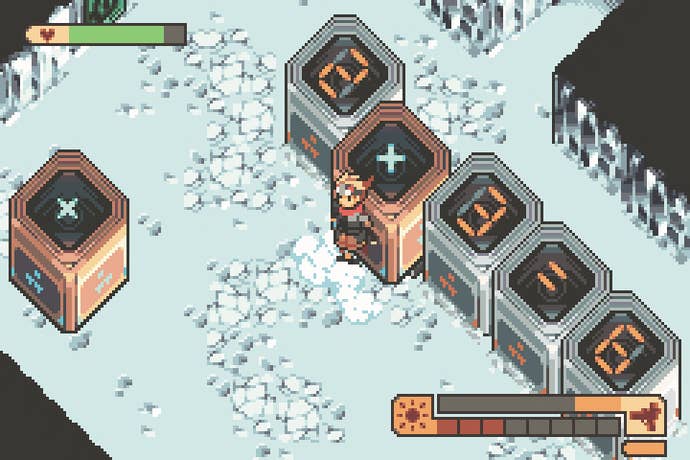
Boktai didn't tolerate cheating, either. We canny players found that we could plug the game into a Game Boy Player and shine a black light on the sensor to duplicate the effect of sunlight even in the dead of night. But with too much sustained light exposure, the game punishes you by overheating Django's weapon and leaving him in even worse condition than if he had no sunlight at all. Boktai wants you to work for your victory.
Understandably, not everyone was keen to play along with these expectations, and Boktai only ever managed to secure a small audience. The third entry in the series didn't even make its way outside Japan. But those who were willing to put up with its demands found much to like; in many ways, Boktai represented what Metal Gear would have become if it hadn't gone in the direction of immersive, cinematic design. All the cleverness of Kojima's most popular series made its way into this more modest creation, with a wonderful level of detail gracing every aspect of the adventure and tons of fun nods to Konami's history (my favorite being the Beatmania gun frame which caused it to emit sound with which to bait and trick enemies). It was a meaty adventure but one short enough not to overstay its welcome, and the lengthy quest parceled itself out in bite-sized installments perfect for portable play.
For me, Boktai offered the perfect excuse to get out and see more of San Francisco. I wanted to experience my new home, and dragging Boktai around with gave me a chance to spend time outside my apartment long before 3DS, Dragon Quest IX, or Street Passing. I found a few quiet, peaceful, and most importantly sunny spots in Golden Gate Park that remain personal favorites a decade later; I sat in Japantown's Peace Plaza, watching the tourists go by as I played; I would even sneak in a few minutes of progress in those fleeting afternoon moments when the sun hit the downtown skyscrapers at just the right angle to slant between them and light up the avenues.
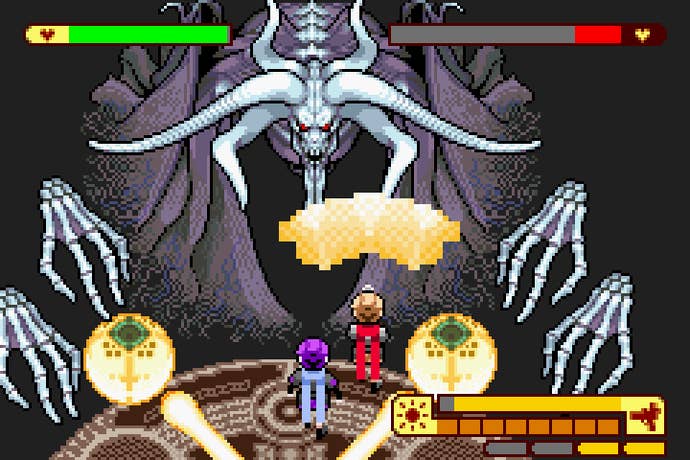
The lengths to which I went to complete Boktai made it one of the most memorable gaming experiences I've ever enjoyed. Even the final boss encounter took on an extra edge of intensity, as it turned into a race against the sunset. As I stood in front of my apartment's west-facing window, the sun made its way beneath the buildings opposite, demanding I finish the job before it sank out of sight lest I have to try again the next day. Finally, with the final rays flickering away, I managed to strike the final blow and destroy the game's ultimate foe. I sank into the shade and watched with relief... only to end up with a bad ending, since there's a bit where you have to absorb sunlight during the epilogue. Oh well.
Boktai was a fantastic game regardless -- not to mention a wholly unique one. Given Konami's growing aversion to risks, it's safe to say we'll never see another Boktai. How could we, when digital distribution is such a fundamental part of the modern business model? Physical media certainly has its disadvantages, but Boktai reminds us the wonderful, surprising inventiveness gaming has sacrificed along its march of progress.
